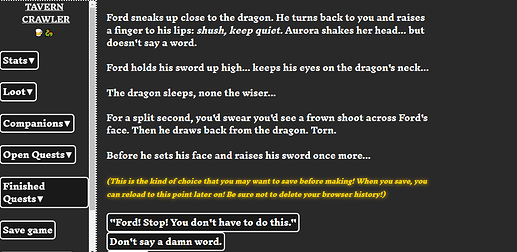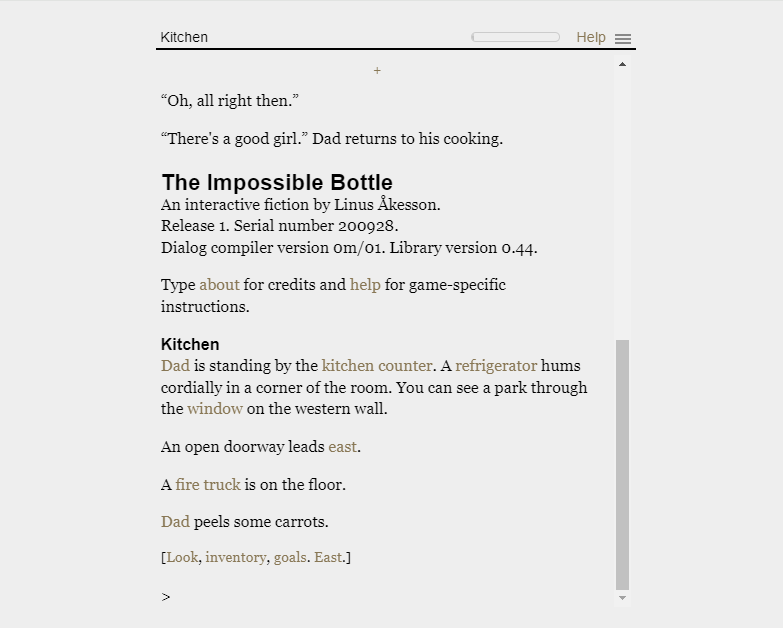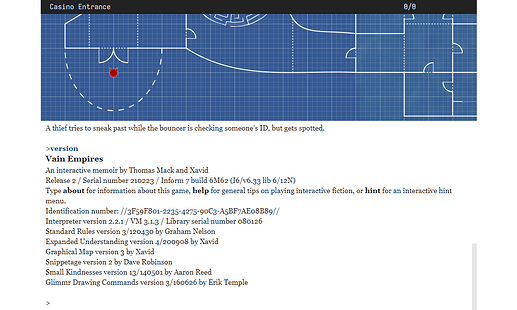Overview and Influences
The year of Covid was the biggest IFComp of all time, coming in at a hefty 103 games! Fittingly, it was also the first comp (since the rule change in 1996) to have 2 first place winners. Maybe all along the rule was 1 winner per 50 games…
Where did that size come from? The prevailing theory that I’ve seen is that mandatory curfews and enforced work from home led people to pick up a lot of hobbies, including, in this case, interactive fiction. There were around 80 games in '19 and around 70 every year since then, so there was definitely a significant bump.
How much did the drastic events of the Covid pandemic show up in the games themselves?
Not as much as you’d think, but definitely more than 0.
-One of the winners, The Impossible Bottle, uses the pandemic to frame some of its story.
-The 14th place winner, Alone, is a tale about the aftermath of a deadly pandemic, which the author says is inspired by Covid.
-Congee, the 18th placing game, is about recovering from illness
-Babyface has a theme around masks (although, not the kind you might think!)
2020 also saw the George Floyd protests, which swept through the US but also made international news. At least one game, Stand Up/Stay Silent, was heavily influenced by the protests, and included links to BLM materials.
Anyone aware of other games from this year with links to cultural events, let me know!
This year was also notable for having several repeat entrants, including Joseph Pentangelo with 2 games, Xavid as co-author on two games, and three interconnected games pseudonymously entered by Joseph Goodness.
Outside of IFComp, some notable games this year included:
-Pageant, the first in the eponymous Pageantverse series of games by Autumn Chen, and
-Stay?, by E. Jade Lomax, a time-loop game which has proven to be one of the most -popular choice-based games of all time on IFDB.
-Tristam Island, which was notable as a commercial (though now free) retro game targetting many, many old platforms.
Finally, many well-known authors from the past entered games in the competition. I started to list them but there were at least 20 games on there, so just know that many excellent authors from years past returned for this year.
I entered a game this year, the last that I have to this point, called The Magpie Takes the Train. It’s notably influenced by Alias: The Magpie, for which it was written as an authorized sequel as a competition prize.
Top Games
Tavern Crawler
This game tied for 1st place, and is also the first Twine game to win IFComp! While a choice-based game had won in the past (Detectiveland), this was the first game to use the once-controversial but now-popular Twine engine and win the comp.
It’s a traditional dungeon romp but with all the polish and trimmings available. Rather than focusing on dozens of stats, it narrows down to just three, plus money. You have a cast of three characters, including you and your two romanceable companions. Your quest couldn’t be more classic: slay the dragon.
But everything has its own twist. The UI has all sorts of subtle and overt features to help gameplay, with colors and sidebars and such. Your companions are three-dimensional, having strengths and weaknesses, and the city feels like a real little microcosm.
The Impossible Bottle
This is the third IFComp game written by the author in his Dialog engine, a variant of Prolog that compiles to Infocom game file formats.
The idea is that you are a little girl that has been asked by her father to clean up for dinner. But you quickly discover that your house is a little…peculiar.
As the plot twists and unique puzzles of this game are much of its charm, I don’t want to spoil it. So I’ll focus on the features that I believe helped this game in the competition. One major advantage is that Dialog, unlike ZIL or Inform, was made with modern browser play in mind. One of the compiling options is to use online-optimized play that allows for multimedia features. The main feature this game uses is a dynamic list of commands that doesn’t appear in the transcript, as well as clickable dialog menus also designed for a nice scrollback and transcript experience.
The majority of the game can be played with links, with, I think, one puzzle that requires you to type in a different command. This was to provide a balance between ease of play for new and casual parser players with non-trivial challenges for parser experts.
Vain Empires
This sprawling devil/angel game was one of the largest in the competition. It comes with a neat graphical map which Xavid has done a few times before (including twice in 2020, the other time being Seasonal Apocalypse Disorder).
In this game, you play as a devil who, intangible, must manipulate others by stealing the thoughts and wants of their hearts and giving them to those you want to manipulate. However, your angelic counterparts are also at work, and seem to be breaking the delicate balance you’ve established over time.
A very strong contender for winner, although a few people noted weaknesses in the final act.
Other Games
As the largest comp of all time, I will of course not be able to mention all games, including many notable ones.
The Eleusinian Miseries
This game marked the debut of Mike Russo, an author who has become well-known for his reviews, both for their size (very long and in-depth) and number (currently 462 on IFDB). He also participates extensively in the IF community, including serving as an editor for The Rosebush magazine.
His first game, Eleusinian Miseries, combines Wodehousian humor with ancient Greek mystery cults. It’s a verbose puzzle fest filled with quips and humor ranging from the educated and obscure to the goofy and boyish. As a first effort, it’s especially impressive. The author would go on to write the game Sting one year later, an autobiographical game with a very different feel but as much or more polish.
A Rope of Chalk
One of the many well-made IFComp games that have been entered by popular author Ryan Veeder over the years, this is a semi-kinda-autobiographical game that reflects on the past (in this case, a sidewalk chalk competition). In the way that it evokes nostalgia for an earlier time and has two frames of reference for time, it reminds me of the trend of ‘game framed as a reviewer/older author revisiting a classic game’ that began to get big in 2021 and on. I don’t believe this game influenced those (they had been in production for a great deal of time) and others I’ve talked to have felt the same, but I feel like this game is unique in several ways and presages some of what would come later. It’s the Neanderthal in the phylogenetic tree of such games; not an ancestor, but someone close enough for communication and mutual interaction.
Lore Distance Relationship
Bez really has a wide range of games and stories, from non-fictional essays on modern issues to elaborate mockups of fictional websites.
This is a fully voice-acted game that features a fake version of the Neopets online game. It shows vignettes spread out over several years as you follow an online friend who grows and changes with you.
The Knot
The Knot is actually three games in a trenchcoat, entered under three different pseudonyms and with three different stories. All of them, however, were tied together by similar cover art and css/styling.
The idea is that each game has a road block in it that can only be solved by one of the other games. Information in one is passed to the rest.
To those that figured it out (and it was spread early on in the forums), it was interesting to connect the three. To those that didn’t, each game was an impassable roadblock. Each game featured a different genre (space, Nazis, and magic).
It wasn’t the first set of games in IFComp history to have secrets to pass around, the first being the Hat Puzzle in 2011.
Accelerate
This is probably the largest (or one of the largest) games in terms of file size in IFComp history, weighing in at a gig. It has 21 chapters of surreal narrative about plots, conspiracies, transhumanism, cults, and who knows what else.
It made extensive use of animation and styling and effects.
The Cursed Pickle of Shireton
Hanon Ondricek’s game was unique in its scope. It’s a simulated MMORPG told using the AXMA system, and includes things like casting spells through quick-reaction clicking. The narrative has many layers, and ends up using multiple authoring systems and a self-recursive style.
You Will Thank Me as Fast as You Thank a Werewolf
This game was written by GPT-2! At this point in time, GPT was kind of a joke. The text and art being put out by AI were pretty easy to spot (as many reviewers did here, although the use of GPT-2 was noted in-game), as they were largely incoherent at the time. “Ha!” we reviewers could say, “How silly; to try to have an AI write text for you.” Little did we know…
Legacy
Never again has the IFComp gotten so large. At the time, it felt to me as if there was just such a strain on players and reviewers, but it has noticeably decreased since then. The extra two weeks given in the judging period definitely helped.
The Dialog system did get a little bump in use after this (and I, as a prize, wrote a sequel in Dialog to The Impossible Bottle called *The Impossible Stairs), but still only a few games have been released in the system.
The use of AI went from easily detectable in this competition to now almost undetectable in 2023 and 2024, and AI-generated images have become a hot topic of discussion.
Several people made their debut in 2020 who later went on to support the IF community in various ways, including Mike Russo, Lance Campbell, Alex Harby, Joey Acrimonious, Seth Paxton, and others.
Interestingly enough, with 2020 having the first Twine 1st placed winner, the next year, 2021, swung heavily back towards parser games, with the top 6 games being parser based, as we will see in the next article.
Made with the support of the Interactive Fiction Technology Foundation



